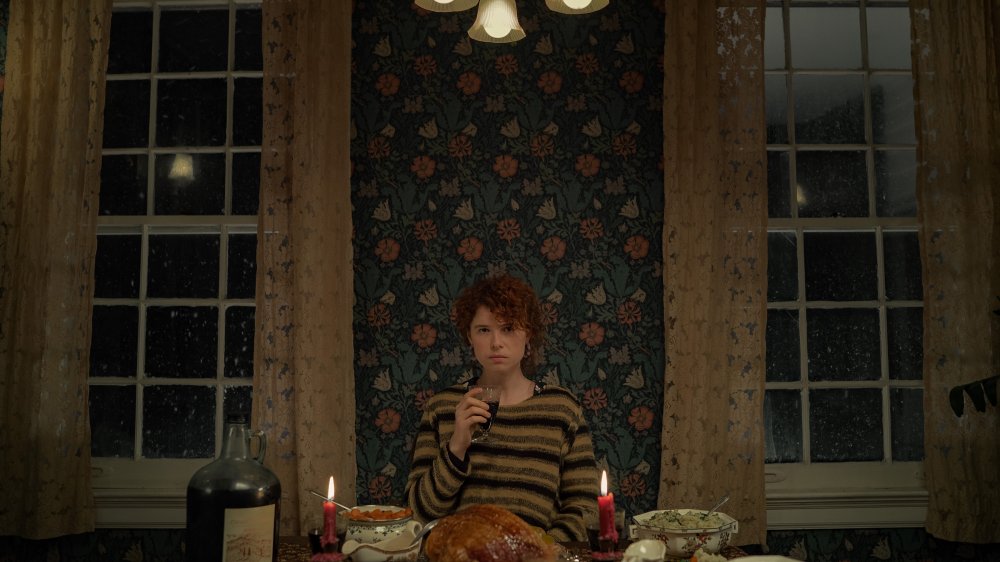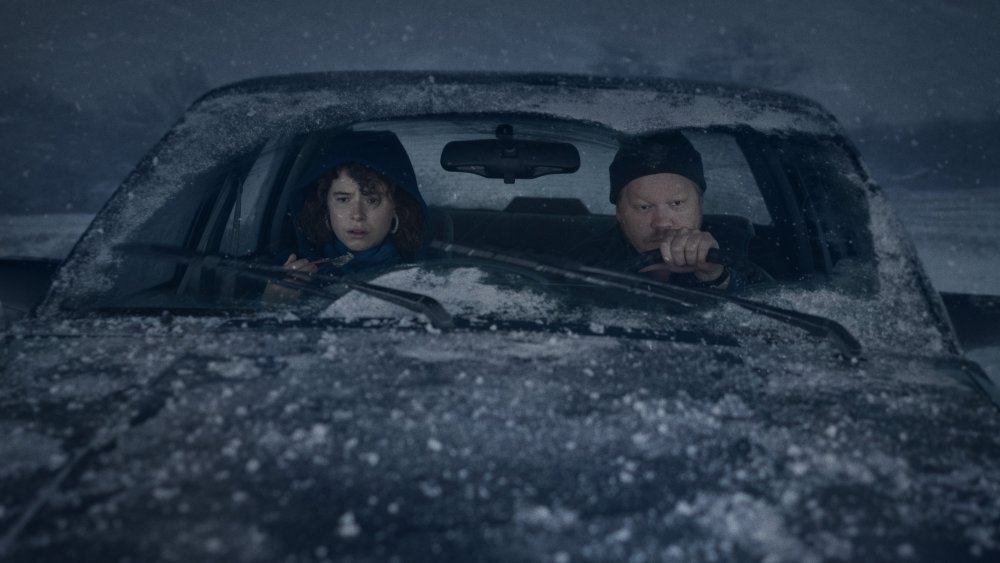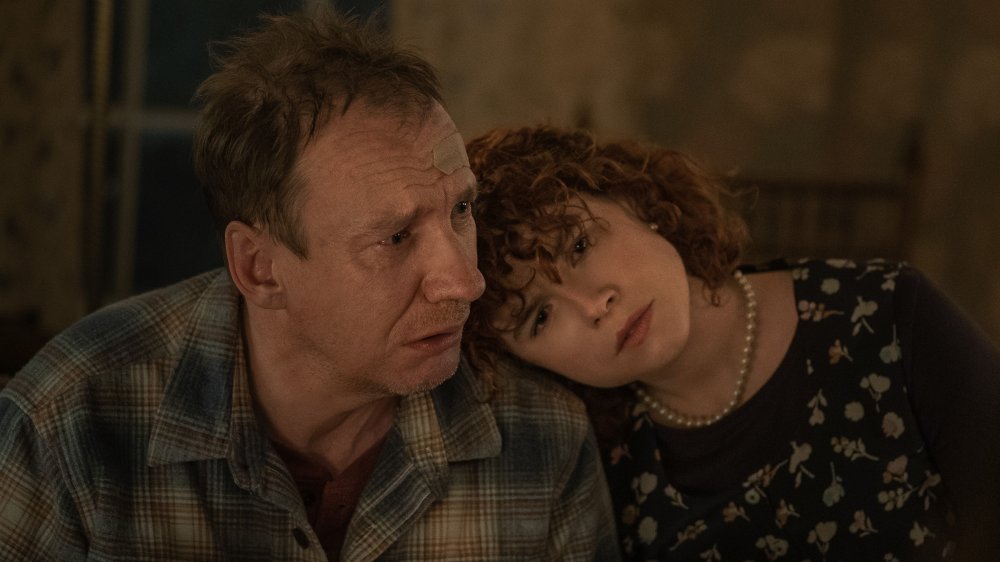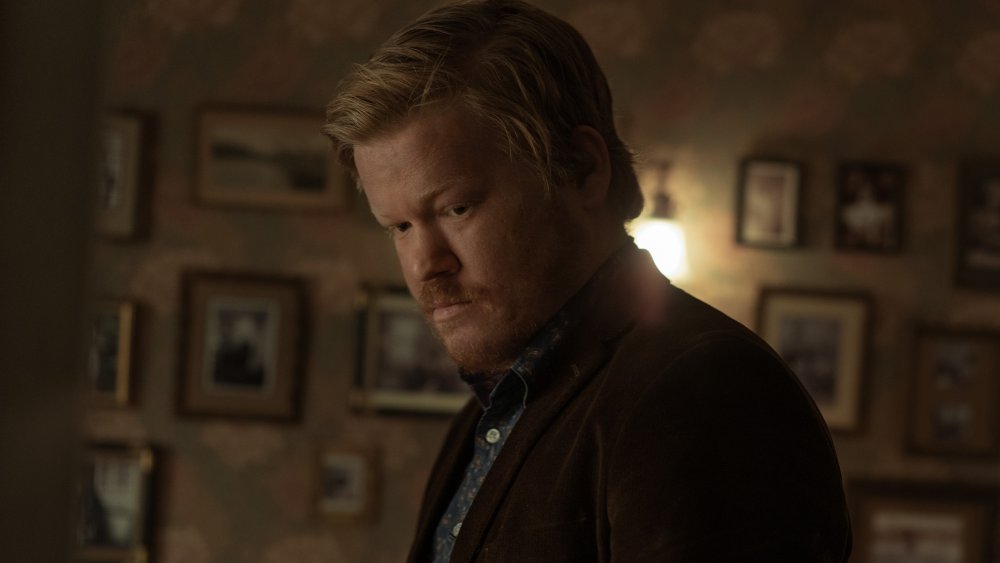The Ending Of I'm Thinking Of Ending Things Explained
The new film from writer-director Charlie Kaufman, I'm Thinking of Ending Things, is the kind of movie that's sure to linger in your mind for quite a while after the credits finish rolling. In it, a young woman heads out on a snowy road trip with her boyfriend to meet his parents. Despite that simple premise, nothing in the movie is truly simple. What follows is a strange journey through the heart of a blizzard, a deeply uncomfortable dinner, and a spooky final trip to a high school ... along with an ending that seems to raise more questions than answers.
But what exactly that ending means might not be super clear, especially if you're not completely brushed up on your Rodgers and Hammerstein musicals. Confused? That's not surprising. Put chains on the tires, shut the car door, and ride along with us as we attempt to explain the ending of I'm Thinking of Ending Things. Spoilers ahead.
A fractured identity
It doesn't take long for I'm Thinking of Ending Things to make the viewer begin to suspect that all is not as it seems. Early in the film, there's ample evidence that Jake (Jesse Plemons) can hear what his girlfriend (Jessie Buckley) is thinking — either asking her to repeat herself or just looking at her whenever she thinks something that she wants to keep secret from him. Additionally, the girlfriend's name changes over the course of the film — it starts as "Lucy" but soon she's answering to "Louisa." Stranger still, when she's called these names, she receives phone calls from contacts with those names on her phone — calls she pointedly ignores. Additionally, very early in the drive, the girlfriend pulls down the passenger seat mirror and we see that it's broken — a clear symbol of her fractured, broken identity.
We also get glimpses of an old man intercut with Jake and his girlfriend driving, while we hear the girlfriend's internal monologue. We see the old man starting his day in the morning, looking out the window at an old swing set, and working as a janitor in a high school. Sometimes these cuts occur right after Jake speaks, which heavily implies that the janitor and Jake are somehow connected.
A life of the mind
Throughout I'm Thinking of Ending Things, we're confronted with yet more visual cues that — not only is Jake connected with the janitor — but the girlfriend is, too. For example: She recites a poem she had written on the way to dinner, and she later reads it out of a book in Jake's childhood bedroom. During the drive, the girlfriend glimpses the same swing set the old man spied out his window, only now it's standing in front of a dilapidated house. The basic events of the story blur and change from scene to scene — the age of Jake's parents, the outfits everyone wears, and the story of how she and Jake first met.
Even more telling, Jake adamantly works to keep her out of the house's basement. When she finally goes in, she discovers the washing machine is full of identical janitor uniforms. Like the broken mirror telling us that the girlfriend's identity and self-image is broken in some significant way, a house's basement is a frequent symbol for a character's subconscious.
Eventually, enough of these kinds of clues stack up to indicate that the girlfriend isn't really there at all — none of the events of the film's main story are happening in consensus reality. They're all happening in the mind of that old man — the janitor.
Lost in the high school
The revelation that the movie is unfolding inside the janitor's mind becomes more explicit by the end. Early in the film, while driving to his parents' house, Jake describes watching the "kids" practice and perform the musical Oklahoma!, though he doesn't specify which kids he's talking about. Immediately after that, we cut again to the janitor, watching high school students rehearsing the show. Later on, when the girlfriend has followed Jake into the supposedly abandoned high school, she runs into the janitor. After they chat, we see a rendition of the "Dream Ballet" sequence from Oklahoma!, but the actors are instead dressed as Jake, the girlfriend, and the janitor.
When the ballet ends, Jake and his girlfriend are gone, and the janitor's left all alone. He changes out of his uniform and back into his clothes, trudges to his pickup truck in the snowy school parking lot, and promptly starts freaking out. All the while, scenes related to the events of Jake and his girlfriend's story play out, seemingly in his mind. He strips naked, then follows the ghost of a dead, maggot-ridden pig back into the school. That's a clear reference to a moment earlier in the film, when Jake tells his girlfriend about how his father had to kill maggot-ridden pigs on the farm many years earlier. After the janitor follows the ghost pig, that's the last we see of him. The film hard-cuts to Jake — wearing high school theater production-level old man makeup — accepting a Nobel Prize, and then singing the song "Lonely Room" from Oklahoma!
Jud is a dud in his lonely room
Time for some context: The antagonist In Oklahoma! is a guy named Jud, a creep who lives alone in a dirty smokehouse and who's infatuated with the musical's heroine, Laurey. His rival for Laurey's affections is Curley, a handsome cowboy. To make a long musical short, no one really likes Jud, and Curley and Laurey toy with him during the course of their own courtship. Along the way, Curley literally tells Jud he should kill himself, because no one likes him, and that's the only way anyone will finally realize how much they should've appreciated him. Needless to say, it's no fun to be Jud.
That's basically Jake in this film. To quote Oklahoma!, Jud is a dud — and to that end, so is Jake the janitor. In the musical, "Lonely Room" is Jud's vow to make Laurey his wife and finally get out of his dingy smokehouse — to go from dud to stud. It's a song of hope and longing from a character who is detested by everyone around him, and by the end of the musical — spoilers — Jud dies, falling on his own knife after he tries and fails to attack Curley on the day of his wedding to Laurey.
The questions the film asks are troubling to ponder: How does it feel to be unloved and unlovable? What's it like to be Jud? What are the lies we tell ourselves to keep from the brutal realization that we might be the dud of someone else's story?
Heroes and hogs
Ultimately, the film's theme is pretty succinctly summed up during the disturbing scene where the janitor follows the ghost pig through the school's halls, presumably on his way to end things.
"It's not bad, once you stop feeling sorry for yourself because you're just a pig — or, even worse, a pig infested with maggots," the pig says. "Someone has to be a pig infested with maggots, right? It might as well be you. It's the luck of the draw."
This is a movie about a hero who's actually a pig infested with maggots. This person is alone and has always been alone. The janitor has never had love, and he's always imagined it from afar, hoping against hope he might someday find a Laurey of his own — even if he has no real idea as to how that might happen. His life isn't like a romantic comedy like the fictional rom-com called Order Up! that he watches during his break about one-third through the film.
I'm Thinking of Ending Things explores what life is like from the perspective of a non-heroic protagonist. We're all the heroes of our own stories. But what if our stories don't go anywhere? What if instead of living happily ever after with your soulmate, you simply get old in your crappy job ... and then, well, you start thinking of ending things?





